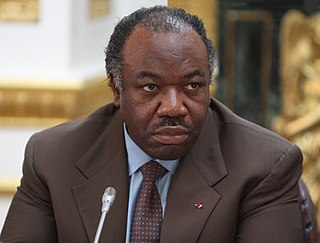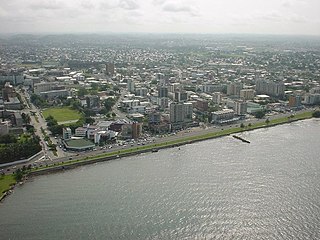Paul Mba Abessole is a Gabonese politician who heads the National Woodcutters' Rally – Rally for Gabon and was a leading opponent of President Omar Bongo during the 1990s. He stood as a presidential candidate twice during the 1990s and also served as Mayor of Libreville, the capital. From 2002 to 2009 he served in the government of Gabon, holding the rank of Deputy Prime Minister for most of that period.

The Gabonese Progress Party is a political party in Gabon.

Presidential elections were held in Gabon on 27 November 2005. Incumbent President Omar Bongo, in power since 1967, sought another seven-year term against four other candidates. According to an announcement of results by the country's interior minister, the result was a victory for Bongo, who received 79.2% of the vote. Bongo was sworn in for another seven-year term on 19 January 2006.
Augustin Moussavou King is a Gabonese politician and the President of the Gabonese Socialist Party (PSG).
Zacharie Myboto is a Gabonese politician and President of the National Union (UN), an opposition party. He was the Administrative Secretary of the Gabonese Democratic Party (PDG) from 1972 to 1990 and served in the government from 1978 to 2001. After resigning from the government, he became an opposition leader, founding the Gabonese Union for Democracy and Development (UGDD) in 2005 and placing third in the 2005 presidential election. He became President of the Group of the Forces of Change in the National Assembly in 2007.
Didjob Divungi Di Ndinge is a Gabonese politician who was Vice-President of Gabon from 1997 to 2009. He is the President of the Democratic and Republican Alliance (ADERE), a political party. As Vice-President of Gabon, Divungi Di Ndinge exercised presidential powers in an acting capacity from May 2009 to June 2009, while President Omar Bongo Ondimba was hospitalized.
Yawovi Madji Agboyibo is a Togolese politician. He served as Prime Minister of Togo from September 2006 to December 2007 and was National President of the Action Committee for Renewal (CAR), an opposition political party, from 1991 to 2008. He is the Honorary President of the CAR.
André Mba Obame was a Gabonese politician. After serving as an adviser to President Omar Bongo in the 1980s, he was a minister in the government of Gabon from 1990 to 1991 and again from 1997 to 2009; during that time, he was identified with the reformist wing of the ruling Gabonese Democratic Party (PDG). He held the key post of Minister of the Interior from 2006 to 2009 and then briefly served as Minister of the Coordination and Follow-up of Government Action in mid-2009. He was an independent candidate in the 30 August 2009 presidential election and placed third with 25.33% of the vote, according to official results, but he claimed victory and alleged that the PDG candidate, Ali Bongo, won through fraud.
Pierre-André Kombila Koumba is a Gabonese politician, professor, and medical doctor. He was the First Secretary of the National Rally of Woodcutters (RNB), Gabon's main opposition party, from 1990 to 1998; he then led a split from the RNB, establishing the more radical National Rally of Woodcutters - Democrats (RNB-D) in 1998. He was nominated as the RNB-D's candidate for the 1998 presidential election, but received only a small share of the vote. Later, he abandoned his opposition to President Omar Bongo and joined the government, serving as Minister of Technical and Vocational Education from 2006 to 2009 and as Minister of Hydraulic Resources and New Energies in 2009. Following Bongo's death, he rejoined the opposition in mid-2009.
Daniel Ona Ondo is a Gabonese politician who has been Prime Minister of Gabon from January 2014 to September 2016. He previously served as Minister of Education and First Vice-President of the National Assembly. He is a member of the Gabonese Democratic Party.
Jules-Aristide Bourdes-Ogouliguende was a Gabonese politician who was the President of the Congress for Democracy and Justice (CDJ), an opposition party. He served as a minister in the government of Gabon from 1976 to 1990 and was President of the National Assembly from 1990 to 1993; from 1993 until his death in 2018.

Early presidential elections were held in Gabon on 30 August 2009. They took place due to the death of incumbent President Omar Bongo on 8 June, after more than 41 years as the sole president of Gabon. While the constitution stated that interim President Rose Francine Rogombé should organise elections within 30 to 45 days, the Constitutional Court accepted the government's request for a delay due to the circumstances.
Paul Biyoghé Mba is a Gabonese politician who was Prime Minister of Gabon from July 2009 to February 2012. A member of the Gabonese Democratic Party (PDG), he served for years as a minister in the government prior to his appointment as Prime Minister. From 2012 to 2015, he was President of the Economic and Social Council of Gabon, and he has again served in the government as First Deputy Prime Minister for Health since 2015.

Bruno Ben Moubamba is a Gabonese politician. As an opposition leader, he stood as a candidate in the 2009 and 2016 presidential elections in Gabon. He served in the government as Minister of Housing from 2016 to 2017.
Louis-Gaston Mayila is a Gabonese politician. He is the President of the Union for the New Republic (UPRN), a political party.
Jean-Félix Mouloungui is a Gabonese politician who was appointed to the government of Gabon as Minister of Small and Medium-Sized Enterprises in October 2009.

Jean-Marie Doré was a Guinean politician who was the Prime Minister of Guinea from January 2010 until December 2010. Doré, who was the President of the Union for the Progress of Guinea (UPG), was an opposition leader for years before being chosen to head a transitional government that was in place during the preparation and conduct of the 2010 presidential election.
Guy-Bertrand Mapangou is a Gabonese politician. He is Minister of Interior, Public Security, Immigration of the new government of Prime Minister Pr Daniel ONA ONDO, the 28 January 2014. He was President of CNC Commission of National Communication since May 2012. He was Deputy Secretary-General and Spokesman of the Presidency of Gabon from October 2009 to January 2011 and he has been Minister-Delegate for State Reform since January 2011.








